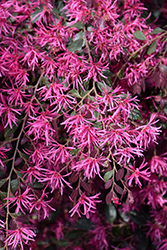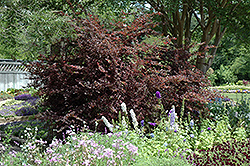Plum Delight Chinese Fringeflower - New For 2025!
Loropetalum chinense 'Plum Delight'
Height: 8 feet
Spread: 8 feet
Sunlight:
![]()
![]()
Hardiness Zone: 7
Other Names: Chinese Fringe Flower, Chinese Witch Hazel
Description:
A delighful spring-blooming shrub with stunning pink strap-like flowers literally smothering the plant; coppery new foliage that matures to plum adds a nice texture; an easy to grow and well-behaved shrub for general garden use
Ornamental Features
Plum Delight Chinese Fringeflower is draped in stunning fragrant hot pink strap-like flowers along the branches in early spring. Its oval leaves emerge coppery-bronze in spring, turning plum purple in color the rest of the year.
Landscape Attributes
Plum Delight Chinese Fringeflower is a multi-stemmed evergreen perennial with an upright spreading habit of growth. Its relatively fine texture sets it apart from other garden plants with less refined foliage.
This is a relatively low maintenance plant, and should only be pruned after flowering to avoid removing any of the current season's flowers. It has no significant negative characteristics.
Plum Delight Chinese Fringeflower is recommended for the following landscape applications;
- Accent
- Mass Planting
- Hedges/Screening
- General Garden Use
Planting & Growing
Plum Delight Chinese Fringeflower will grow to be about 8 feet tall at maturity, with a spread of 8 feet. Although it is technically a woody plant, this fast-growing plant can be expected to behave as a perennial in our climate if planted outdoors over the winter, usually regrowing from its base (crown) the following year. As such, gardeners should take into consideration that it will perform differently than it would in its native habitat.
This plant does best in full sun to partial shade. It prefers to grow in average to moist conditions, and shouldn't be allowed to dry out. It is particular about its soil conditions, with a strong preference for rich, acidic soils. It is somewhat tolerant of urban pollution. Consider applying a thick mulch around the root zone in winter to protect it in exposed locations or colder microclimates. This is a selected variety of a species not originally from North America.



